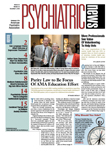Cognitive-behavioral therapy (CBT) combined with a selective serotonin-reuptake inhibitor is more effective than either treatment alone for pediatric anxiety disorders, a large randomized, controlled clinical trial funded by the National Institute of Mental Health has found.
The study recruited patients from December 2002 to May 2007. Results from phase 1 of the study, which evaluated the effectiveness of three active treatments compared with placebo in the first 12 weeks, were published online in the New England Journal of Medicine on October 30.
Researchers at six academic medical centers enrolled 488 children aged 7 to 17 who had a primary diagnosis of separation anxiety disorder, generalized anxiety disorder, or social phobia.
These patients were randomly assigned to one of four treatment groups: CBT only (n=139), sertraline only (n=133), combined CBT and sertraline (n=140), and an oral placebo (n=76). Patients in the placebo or sertraline-only groups did not know their treatment assignment, but those in the combination therapy group or CBT-only group knew they were not taking placebo.
At the end of the 12-week treatment, 80.7 percent of patients in the combination treatment group were rated as very much or much improved by independent evaluators who were unaware of treatment assignments. The assessment was made on the basis of the seven-point Clinician Global Impression–Improvement (CGI-I) scale, in which a score of 1 or 2 reflects “a substantial, clinical meaningful improvement in anxiety severity and normal functioning” compared with baseline, according to the authors.
The improvement of the combination treatment group was significantly greater than that of the monotherapy groups. Approximately 60 percent in the CBT-only group and 55 percent in the sertraline-only group were found to be“ very much improved” or “much improved” at week 12. Both monotherapies were significantly superior to placebo, with only 24 percent of placebo patients very much or much improved.
CBT was provided in 14 60-minute sessions over the 12 weeks for both the CBT-only and the combination treatment groups. Pharmacotherapy began with 25 mg/day of sertraline, and the dose was adjusted up to 200 mg/day. Patients in the placebo and sertraline-only groups visited the study sites for eight 30- to 60-minute sessions to assess their symptoms and adverse events.
“The study shows that we have three really good treatment options,” John Walkup, M.D., an associate professor of psychiatry and deputy director of the Division of Child and Adolescent Psychiatry at Johns Hopkins Medical Institutions and lead author of the study, told Psychiatric News. “In places where it is available, combination therapy is the way to go.”
He pointed out that the effectiveness of CBT alone provides assurance to parents who are reluctant to put their children on medications. “In communities where CBT is not available, because we are not training enough clinicians to do manualized CBT, medication is not a bad idea.” He noted that sertraline was relatively well tolerated even though the mean dosages were 133.7 mg/day in the combination treatment group and 146.0 mg/day in the sertraline-only group.
Fourteen patients dropped out of the study because of adverse events, including three in the combination-therapy group, eight in the sertraline-alone group, and three in the placebo group. CBT appeared to be better tolerated than the other treatments. The CBT-only group had the fewest dropouts—none withdrew because of adverse events or symptom worsening.
The average age of study patients was under 11 years, and most had moderate to severe anxiety and impairment. More than three-quarters were diagnosed with two or more primary anxiety disorders, and more than half had a secondary diagnosis of another psychiatric disorder that was less severe than the anxiety disorder. Patients with suicidal ideation at the time of enrollment were excluded from the study, but those with only a history of suicidal ideation were not.
No suicide attempt was made by any subject in the study. Five patients in the combination group, five in the CBT-only group, and one in the placebo group reported suicidal ideation; none did in the sertraline-only group.
The CBT approach used in the study was based on the Coping Cat program manual. It included teaching children anxiety-management skills, implementing behavioral exposure to anxiety-causing situations, and two parent-only sessions.
Because this study and previous research have demonstrated that CBT is generally as effective as medication alone, Walkup hoped the finding would encourage pediatric medicine, not just psychiatry, to incorporate training programs for this evidence-based intervention. “There aren't enough specialists to meet the needs of these anxious kids,” he said. “We need to train more clinicians who can do both CBT and medication management to fulfill the promise of these treatments.”
An abstract of “Cognitive Behavioral Therapy, Sertraline, or a Combination in Childhood Anxiety” is posted at<content.nejm.org/cgi/content/abstract/NEJMoa0804633v2>.▪
